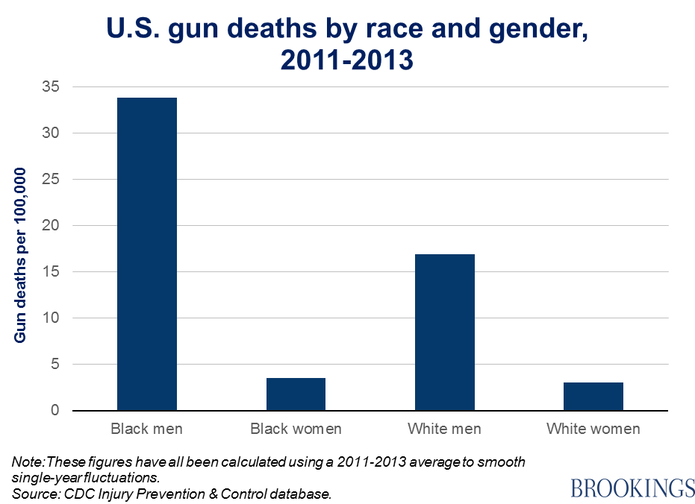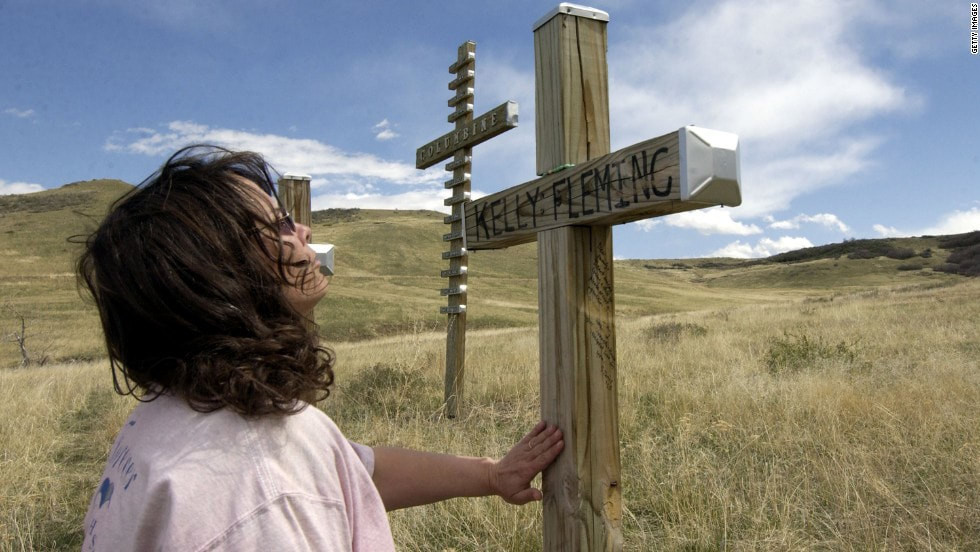GUNS and RACE in AMERICA
In the article "How Racial Prejudice Helps Drive Opposition to Gun Control," Alexandra Filindra phrases what many already knew but could not articulate: that the correlation between race and gun and what guns represent specifically to African Americans and whites. Filindra is describing the possibilities for why in a survey conducted by the University of Illinois in 2015, eighty-five percents of whites ranked the "right to bear arms" to be the top three important government guarantees while only twenty-four of African Americans did the same. Filandra suggests that it has to do with what owning a firearm represent to whites and African Americans. For whites, she claims, it has to do with patriotism and being a true American. For African Americans on the other hand, firearms are more connected to the centuries of violence they endured under such weapon.
"Consider the tragic death of 25 year-old African-American Kajieme Powell in St. Louis this summer. Powell came to the attention of St. Louis County police on August 19 when he stole two energy drinks and packet of pastries from a local convenience store. He made no attempt to get away, however. Instead, he placed the cans on the ground outside the store and paced nervously back and forth, as if waiting for something. When two police officers arrived on the scene, Powell walked toward them with a kitchen knife in his hand, yelling, “Shoot me!” As he closed in on the officers, they obliged, shooting him dead.
It was a textbook example of suicide-by-cop. And yet very little of the subsequent national conversation mentioned the issue of mental health. Instead, we got the standard character assassination that is so common when African-Americans are involved as perpetrators. Comments like this one by NBC contributor Jeff Halevy: “Knife-wielding thug who just robbed a store. Get over it. It’s not always race.”
It’s not always race? Then why is a perpetrator immediately dehumanized when he is African-American? He is a “thug” who was involved in a “drive-by.” Or he’s a “gang banger” who got caught up in “inner city violence” ... Convenient terms to let people know that it was a black person who pulled the trigger. Mental health is not part of the discussion, even in cases like Powell’s where it’s an obvious factor.
Conversely, when an episode of mass gun violence involves a white perpetrator (think Jared Loughner, James Holmes, Elliot Rodger, among others), the conversation immediately turns to mental health. The shooter was “deranged” and probably on medication, we are told. And we’ll hear asides like, “He seemed like such a good person” or “We never could have seen this coming.”"
http://www.huffingtonpost.com/josh-horwitz/the-racial-double-standar_b_5957816.html
Correlation between Race and Gun Control
"Eighty-four percent of gun owners in the United States are white, according to data from the 2012 American National Election Study (ANES). Since whites make up 63 percent of the U.S. population, their representation among gun owners is higher than their share of the general population.
Polls show that whites also make up the majority of those who oppose stricter gun regulations. In a July 2015 Pew poll, for instance, 57 percent of whites said it was more important “to protect the right of Americans to own guns” than to “control gun ownership.” Among blacks and Hispanics, that number was just 24 percent. In a 2015 survey conducted through the University of Illinois in Chicago, we asked respondents to rank the importance of key government guarantees. Eighty-five percent of whites ranked the “right to bear arms” among the top three, while only 24 percent of blacks did.
Research finds that support for gun rights is strongest among whites who are racially prejudiced. In a study conducted by Kerry O’Brien and colleagues using data from the ANES, “racial resentment,” a common measure of racial prejudice, is correlated with both gun ownership and opposition to gun control. For each 1-point increase on the 5-point racial resentment scale, there is a 50 percent increase in the odds of owning a gun. Similarly, those who score high on racial resentment are 25 percent less likely to support “making it more difficult to buy a gun” than whites who score low. Those results withstand controls for respondents’ demographics, political preferences, and values."
"The “right to bear arms,” conjures the image of the virtuous, independent — and white — citizen-soldier, and this gives those white gun owners a feeling of a proud, positive racial identity. In this conception, firearms embody whites’ true “American-ness” — and distance them from those perceived to be dependent on the state rather than independent guardians of the Republic, thus violating these “American” values. The symbolism does not quite work for blacks, for whom guns have strong cultural associations not with virtue but with violence."
https://www.washingtonpost.com/news/monkey-cage/wp/2016/06/21/heres-the-surprising-reason-some-white-americans-oppose-gun-regulation/?utm_term=.a17510fbf8fc
Guns and Civil Rights
https://medium.com/@Chris_arnade/race-and-guns-it-isnt-complicated-835a0248952#.s9wusj9kx
"Consider the tragic death of 25 year-old African-American Kajieme Powell in St. Louis this summer. Powell came to the attention of St. Louis County police on August 19 when he stole two energy drinks and packet of pastries from a local convenience store. He made no attempt to get away, however. Instead, he placed the cans on the ground outside the store and paced nervously back and forth, as if waiting for something. When two police officers arrived on the scene, Powell walked toward them with a kitchen knife in his hand, yelling, “Shoot me!” As he closed in on the officers, they obliged, shooting him dead.
It was a textbook example of suicide-by-cop. And yet very little of the subsequent national conversation mentioned the issue of mental health. Instead, we got the standard character assassination that is so common when African-Americans are involved as perpetrators. Comments like this one by NBC contributor Jeff Halevy: “Knife-wielding thug who just robbed a store. Get over it. It’s not always race.”
It’s not always race? Then why is a perpetrator immediately dehumanized when he is African-American? He is a “thug” who was involved in a “drive-by.” Or he’s a “gang banger” who got caught up in “inner city violence” ... Convenient terms to let people know that it was a black person who pulled the trigger. Mental health is not part of the discussion, even in cases like Powell’s where it’s an obvious factor.
Conversely, when an episode of mass gun violence involves a white perpetrator (think Jared Loughner, James Holmes, Elliot Rodger, among others), the conversation immediately turns to mental health. The shooter was “deranged” and probably on medication, we are told. And we’ll hear asides like, “He seemed like such a good person” or “We never could have seen this coming.”"
http://www.huffingtonpost.com/josh-horwitz/the-racial-double-standar_b_5957816.html
Correlation between Race and Gun Control
"Eighty-four percent of gun owners in the United States are white, according to data from the 2012 American National Election Study (ANES). Since whites make up 63 percent of the U.S. population, their representation among gun owners is higher than their share of the general population.
Polls show that whites also make up the majority of those who oppose stricter gun regulations. In a July 2015 Pew poll, for instance, 57 percent of whites said it was more important “to protect the right of Americans to own guns” than to “control gun ownership.” Among blacks and Hispanics, that number was just 24 percent. In a 2015 survey conducted through the University of Illinois in Chicago, we asked respondents to rank the importance of key government guarantees. Eighty-five percent of whites ranked the “right to bear arms” among the top three, while only 24 percent of blacks did.
Research finds that support for gun rights is strongest among whites who are racially prejudiced. In a study conducted by Kerry O’Brien and colleagues using data from the ANES, “racial resentment,” a common measure of racial prejudice, is correlated with both gun ownership and opposition to gun control. For each 1-point increase on the 5-point racial resentment scale, there is a 50 percent increase in the odds of owning a gun. Similarly, those who score high on racial resentment are 25 percent less likely to support “making it more difficult to buy a gun” than whites who score low. Those results withstand controls for respondents’ demographics, political preferences, and values."
"The “right to bear arms,” conjures the image of the virtuous, independent — and white — citizen-soldier, and this gives those white gun owners a feeling of a proud, positive racial identity. In this conception, firearms embody whites’ true “American-ness” — and distance them from those perceived to be dependent on the state rather than independent guardians of the Republic, thus violating these “American” values. The symbolism does not quite work for blacks, for whom guns have strong cultural associations not with virtue but with violence."
https://www.washingtonpost.com/news/monkey-cage/wp/2016/06/21/heres-the-surprising-reason-some-white-americans-oppose-gun-regulation/?utm_term=.a17510fbf8fc
Guns and Civil Rights
https://medium.com/@Chris_arnade/race-and-guns-it-isnt-complicated-835a0248952#.s9wusj9kx
A woman known only as Golden Eagle prays next to one of the thirteen original crosses that was built and placed in Clements Park next to Columbine High School after the shooting on April 20, 1999
Communities: Solidarity and Trust; Suspicion and Violence
Communities of Color
Police Communities
Communities of Color
Police Communities

Communities: Solidarity and Trust; Suspicion and Violence
Communities of Color
Police Communities
Communities of Color
Police Communities

